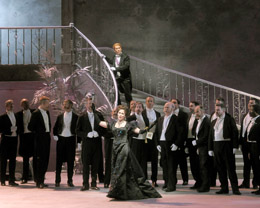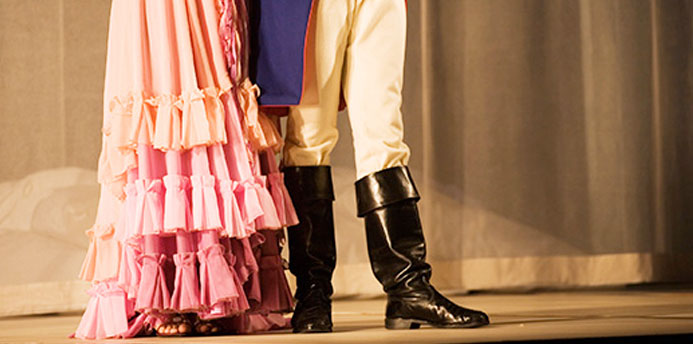Opera is a terrific entertainment for all ages.
Brilliant vocalism is the centerpiece, of course—opera is famous for its solo and ensemble singing—but it also incorporates thrilling choral and orchestral music, plus the visual stimulation of fabulous scenery and costumes, and the theatrical excitement of great acting, dancing, even sword-fighting.
It’s all performed live, almost always without any microphones or amplification, which at Lyric Opera of Chicago means before an audience of up to 3,500.
That said, opera’s subject matter generally skews more naughty than nice; opera plotlines brim with characters behaving badly in all kinds of ways. Fortunately, lots of brave heroes and heroines do triumph (mostly) over those dastardly deed-doers. With a bit of grown-up guidance, youngsters can readily relate to the good-guy, bad-guy dynamic so often found at the opera house. And hey, compared to most of what’s out there on TV and at the movies, opera is relatively tame!
Adults will find lots to talk about with their young guests following an opera performance:
- Which character was most interesting to you and why?
- Did any of the characters remind you of people you know, or of characters from your favorite movies or TV shows? How?
- Who would you want to be like in the opera and why?
- Why do you think a certain character got in trouble for what he/she did?
These kinds of questions can help youngsters explore and enjoy the opera experience long after the lights come up after the show.
In general, 10 is a good age to introduce youngsters to live opera because they have to:
- be able to read the projected translations easily in order to follow the story;
- be old enough to make sense of the stories; and
- sit silently and still for an hour or more. And silent means silent: you don’t want to be subjected to the dreaded “SSSSSSSSSSSHHHHHHHHHH!!” during a performance!
Which operas at Lyric are the most kid-friendly this season? We asked Lyric’s director of education, Mark Riggleman.
 The Merry Widow
The Merry Widow
“[It] is accessible—it’s in English—so for younger children that would be the best start,” Riggleman recommends. “Nobody dies, and unlike in most operas, the characters talk sometimes. Operettas such as The Merry Widow typically include spoken dialogue as well as singing.”
There’s also lots of lively dancing and physical tomfoolery to engage everyone’s attention, and a sparklingly glamorous and agile young cast with a couple of comical older characters. (Performances continue through Jan. 16.)
The Elixir of Love
“It’s our student matinee and Opera in the Neighborhoods and Opera in the Classroom opera,” Riggleman continues, “so lots of youngsters in the Chicago area are being exposed to it this season through Lyric’s education programs in their schools and at the opera house. It’s a romantic comedy with endearingly silly characters that may make youngsters and their parents giggle out loud.”
And there’s a real horse onstage! (Performances Jan. 23-Feb. 22)
Tosca
“At the other end of the spectrum—everybody dies!” Riggleman notes with a laugh. “This might be better for slightly older children, 12 and up, who can handle a plot line that includes torture, murder, a firing squad and suicide. It is a classic grand opera with beautiful music and a melodramatic story.”
An added bonus for kids is seeing members of the Chicago Children’s Choir performing in Act One. (Performances Jan. 10-29)
The Damnation of Faust
“Anything with the devil in it is going to be interesting,” Riggleman says. “The transformation of Faust from bitter and old to young and appealing can make for some good talking points after a performance.”
This new production will have a contemporary, high-tech setting (more akin to a fast-paced music video than a traditional opera) with Faust as a computer scientist who gets “beamed” out of his cubicle, proving that not all operas are set “long ago and far away.” (Performances Feb. 20-Mar. 17)
The Marriage of Figaro
“[This] is a subtler work that might be better for older kids,” Riggleman says. “Nobody dies, but it’s a complex encapsulation of the human condition. It covers a wide range of emotions and behaviors that are easily recognizable by teenagers, including young love and jealousy. They can relate to the teenage crushes of Cherubino, but they’ll have to get past the fact that it’s a girl playing a boy!”
(Performances Feb. 28-Mar. 27)
The best way to prepare in advance for your visit to the opera with youngsters is to surf around together or separately on Lyric’s website: www.lyricopera.org. You can watch video clips of Lyric productions, listen to interviews and audio excerpts, look at production photos and read articles about each opera.
Although fancy clothes aren’t required, many youngsters and adults enjoy dressing up for the opera, whether in a new dress or a nice sport coat. It’s worth it to arrive early before a performance, so youngsters can take in the gorgeous Art-Deco interior of the Civic Opera House, and perhaps even enjoy a light meal or snack in the Florian Opera Bistro on the third floor, which is filled with fabulous photos and posters and even a vintage costume from Lyric’s 55-year history.
Lyric Opera of Chicago and its home in the Civic Opera House are among the crown jewels of the city. What a pleasure to be able to share them with the youngsters in your life.

